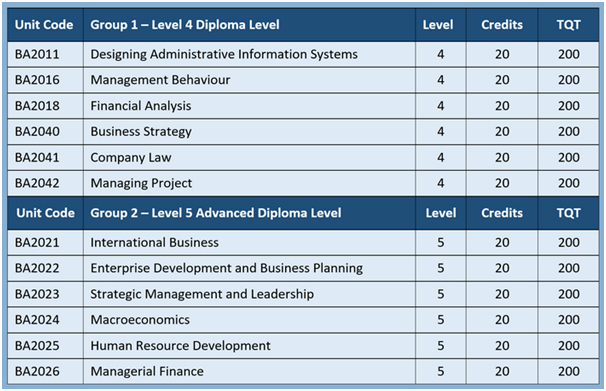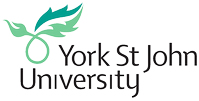Qualification Overview
The Advanced Diploma in Business Administration meets the needs of those wanting to gain a qualification which provides a firm grounding in business administration and a basis for the further academic study.
This course focuses on the functional areas of management and administration within an organisation and how those disciplines integrated at the operational level, linking with the overall corporate strategy to achieve short, medium and long-term objectives.
It identifies the essential characteristics of managing information systems, business analysis techniques, internal and external business structures, management control, financial management and management behaviour. It aims to develop learners’ critical thinking and problem-solving skills.
At the end of this programme, learners will be able to,
- Develop administrative skills to manage information systems within the organisation.
- Develop problem-solving techniques and critical thinking skills in a business situation.
- Demonstrate an understanding of the internal structure and external relationship for companies doing business at an international level.
- Demonstrate an understanding of the management control and planning.
- Examine the concept of entrepreneurship including behaviours, processes and skills relate to small business and enterprise.
- Manage budget and perform financial analysis to the organisations for effective decision making.
- Manage complex issues in the organisation to improve management practice.
- Perform environmental analysis for strategic marketing decision making to implement the strategy.
- Develop managerial and leadership skills to manage team performance.
- Gain knowledge about the advanced economic literature and legal systems in which business operate.
- Develop, test, implement and monitor a new project within an organisation.
- Understand human resource techniques and tools to manage employees’ performance and retention.
- Apply research methodologies for effective decision making.
- Develop an ability to analyse information and to identify a research question and to apply advanced research techniques and tools to create new literature which is justifiable and measurable.
Course Structure
The overall structure of the course is based on 12 mandatory modules that cover a number of topics relating to learning outcomes. Each unit has the equivalency of 20 credits. Learners must complete all units successfully and achieve 240 credits before the Diploma can be issued. Total Qualification Time (TQT) to complete the full qualification is 2400 hours. While, Guided Learning Hours (GLH) refers to the amount of study undertaken by learners under the direction of their tutors and it includes tutorials, seminars, workshops, directed research, project or assignment.
It is expected that a learner will need to complete following TQT against each unit to complete six units from Group 1 and six units from Group 2 to achieve the full Level 5 Advanced Diploma in Business Administration.

Entry Requirements
Learner(s) must fulfil the following criteria to be allowed entry to EBMA Advanced Diploma;
- Qualifi / EBMA Level 3 Diploma in Business Innovation and Entrepreneurship or
- Higher Secondary School Certificate/A Level or
- Any qualification equivalent to one of the above
Assessment
- The methods for assessing student performance can be broadly summarised under coursework by following instructions for coursework. Both categories of assessment tool have particular functions within the learning experience of students and can be used to evaluate different aspects of learning outcomes.
- Learners are required to develop an assignment of each unit minimum 2000 words in length. Assignments are important part of learners’ work at the Centre. There are strict rules about:-
- plagiarism – using another person’s words out of a book/ journal article/ conversation/ lecture without formally acknowledging it,
- referencing - how to reference and refer to another person’s work in your written work so you avoid plagiarism,
- word length of essays and reports,
- Presentation and style of a report, including the style of language used, and
- Learners are required to sign a declaration of authentication to confirm that the work is their own and that any assistance given and/or sources used have been acknowledged.
- All learning outcomes must be assessed using assignment appropriate to the assessment of knowledge, understanding and skills. The Qualifications within this suite are vocational because they support a Learner's career progression. Assessments will contain a question strand for each of the given unit’s Learning Outcomes. The assignment tasks will address the LO (Learning Outcome) and AC (Assessment Criteria) requirements. Within assignments there will always be requirements for Learner’s to engage with important and relevant theory that underpins the subject area
- There must be valid, sufficient, and authentic evidence of all the assessment criteria.
- Submitted assignments should be marked by an assessor. In order to pass a unit, a learner must achieve 40% marks in each assignment.
- Assessors must plan, gather and then assess learner’s evidence according to advanced diploma level descriptors’ requirements and on the basis of following generic marking criteria. These should be made available for internal moderation to the centre Internal Quality Assurer (IQA).
- EBMA External Quality Assurer (EQA) undertakes external moderation to monitor the assessment, internal moderation processes within the centre to make sure the assessment remains fit for purpose, and that the assessment process and practices by the centre continue to meet assessment standards requirements.
Fees Information
Learner(s) can study this qualification directly with EBMA through its virtual learning environment, or via recognised centres. Recognised centres are training providers, employers, colleges or universities, which are recognised by EBMA to deliver this qualification.
Study Directly with EBMA – Online through its virtual learning environment
UK & International Students Fees: £1800.00 (£150.00/unit)
Study with EBMA Recognised Centres
In this case, you just have to pay Registration fee to EBMA. However, your study centre will charge course tuition fee.
Please consult through our fees page for latest information
Support and Training
Qualification Specification
Qualification specification includes all elements and requirements with respect of each of the details that apply to the qualification. Qualification specification is useful document for students, centres and centre staff.
Training for Centre Staff
Book your training today and achieve recognised qualification in assessment and internal quality assurance. Following courses are available for individuals those who want to become assessors & IQA/IV.
Assessor
- Level 3 Award in Understanding the Principles and Practices of Assessment (QCF)
- Level 3 Award in Assessing Competence in the Work Environment (QCF)
- Level 3 Award in Assessing Vocational Achievement (QCF)
- Level 3 Certificate in Assessing Vocational Achievement (QCF)
Internal Quality Assurance/Internal Verifier
- Level 4 Award in Internal Quality Assurance of Assessment Processes and Practice (QCF)
- Level 4 Certificate in Leading the Internal Quality Assurance of Assessment Processes and Practice (QCF)
Please contact us if you would like to book your training and to achieve recognised qualification in assessment and internal quality assurance.
Career Development
EBMA Level 5 Advanced Diploma in Business Administration offers and provides careers related guidance and support to students which are -
- Positive, constructive and helpful
- Practical
- Realistic
- Impartial and client centred
- Progression onto Top UP one Year BA (Hon) degree at UK recognised University
- Progression onto EBMA Level 6 Graduate Diploma in Business Administration Leading to MBA at an advanced level or Certificate stage in Business related masters’ qualification.
The Advanced Diploma in Business Administration provides range of knowledge and skills relating to international business, entrepreneurship, management and leadership, finance, marketing, business law, sales force management and research methods for managers. Graduate can utilise these skills to find a good and well paid job in all areas of management and administration.
University Pathways - Articulation And Progression

BA (Hons) International Business Top Up
EBMA Level 5 Advanced Diploma in Business Administration is recognised by the University of South Wales for entry onto its BA (Hons) International Business Top Up degree (Direct Entry onto its Final Year).
UK, EU and Non-EU (International) students are eligible to apply directly to the University.
Students must have at least 65% marks (Merit)
Further information, please visit http://www.southwales.ac.uk/courses/ba-hons-international-business-top-up/

BA (Hons) Business Management Top Up
EBMA Level 5 Advanced Diploma in Business Administration is recognised by the York St John University for entry onto its BA (Hons) Business Management Top Up degree (Direct Entry onto its Final Year).
UK, EU and Non-EU (International) students are eligible to apply directly to the University.
Further information, please visit https://www.yorksj.ac.uk/study/undergraduate/courses/top-up-degrees/business/business-management/

BA (Hons) Business Management and Finance Top Up
EBMA Level 5 Advanced Diploma in Business Administration is recognised by the York St John University for entry onto its BA (Hons) Business Management and Finance Top Up degree.
UK, EU and Non-EU (International) students are eligible to apply directly to the University.
Further information, please visit https://www.yorksj.ac.uk/study/undergraduate/courses/top-up-degrees/business/business-management--finance/





